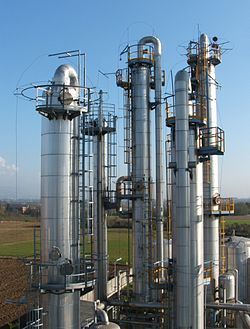Chemical Engineering
Chemical Engineering is the branch of Engineering that applies the physical sciences (e.g., chemistry and physics) and/or life sciences (e.g.,biology, microbiology and biochemistry) together with mathematics and economics to processes that convert raw materials or chemicals into more useful or valuable forms. In addition, modern chemical engineers are also concerned with pioneering valuable materials and related techniques – which are often essential to related fields such as nanotechnology, fuel cells and biomedical engineering. Within chemical engineering, two broad subgroups include:
- design, manufacture, and operation of plants and machinery in industrial chemical and related processes (chemical processengineers);
- development of new or adapted substances for products ranging from foods and beverages to cosmetics to cleaners to pharmaceutical ingredients, among many other products (chemical
product engineers).
Concepts
Chemical engineering involves the application of several principles. Key concepts are presented below.
Chemical reaction engineering
Chemical reactions engineering involves managing plant processes and conditions to ensure optimal plant operation. Chemical reaction engineers construct models for reactor analysis and design using laboratory data and physical parameters, such as chemical thermodynamics, to solve problems and predict reactor performance.
Plant design
Chemical engineering design concerns the creation of plans and specification, and income projection of plants. Chemical engineers generate designs according to the clients needs. Design is limited by a number of factors, including funding, government regulations and safety standards. These constraints dictate a plant's choice of process, materials and equipment.
Process design
A unit operation is a physical step in an individual chemical engineering process. Unit operations (such as crystallization, drying and evaporation) are used to prepare reactants, purifying and separating its products, recycling unspent reactants, and controlling energy transfer in reactors.On the other hand, a unit process is the chemical equivalent of a unit operation. Along with unit operations, unit processes constitute a process operation. Unit processes (such as nitration and oxidation) involve the conversion of material by biochemical, thermochemical and other means. Chemical engineers responsible for these are called process engineers.
Transport phenomena
Transport phenomena occur frequently in industrial problems. These include fluid dynamics, heat transfer and mass transfer, which mainly concern momentum transfer, energy transfer and transport of chemical species respectively. Basic equations for describing the three transport phenomena in the macroscopic, microscopic and molecular levels are very similar. Thus, understanding transport phenomena requires thorough understanding of mathematics.
Applications and practice
Chemical engineers use computers to manage automated systems in plants.Chemical engineers develop economic ways of using materials and energy as opposed to chemists who are more interested in the basic composition of materials and synthesizing products from such. Chemical engineers use chemistry and engineering to turn raw materials into usable products, such as medicine, petrochemicals and plastics. They are also involved in waste management and research. Both applied and research facets make extensive use of computers.
Operators in a chemical plant using an older analog control board, seen in Germany, 1986. A chemical engineer may be involved in industry or university research where they are tasked in designing and performing experiments to create new and better ways of production, controlling pollution, conserving resources and making these processes safer. They may be involved in designing and constructing plants as a project engineer. In this field, the chemical engineer uses their knowledge in selecting plant equipment and the optimum method of production to minimize costs and increase profitability. After its construction, they may help in upgrading its equipment. They may also be involved in its daily operations.
